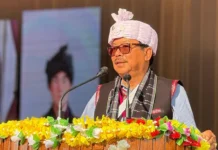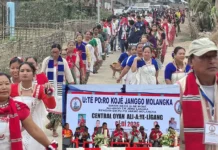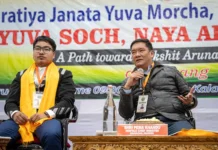[Tongam Rina ]
The All Arunachal Pradesh Students’ Union (AAPSU) has been at the forefront of the anti-refugee movement in the state for decades now. As opposed to the flip-flop by the central government on the status of the refugees in the state – primarily the Chakma and Hajong communities – the union has been consistent in its demand that refugees leave the state.
The AAPSU still has large-scale support of the people because of its consistency on the refugee issue, and because there is an AAPSU member in every tribal household in the state.
Though the union is not necessarily known for working for the welfare of the students, the AAPSU has formidable number and all it needs is a circular to activate its members from schools to university to get to work.
The people of the state have largely supported the union, which is also known as a platform for honing political leadership skills as well as the intricacies of money-minting ‘contract’ work.
But the recent initiative of the union to drive out people without inner line permits (ILP) throws up more questions than answers.
Since the National Registry of Citizens was made public in Assam on 30 July, the Arunachal Pradesh Police had already intensified the ILP checks to stop crossover of people from Assam with doubtful citizenship.
The AAPSU jumped in after giving a 15-day notice to illegal immigrants to leave the state and Indians to get their ILPs.
The modus operandi chosen by the union and the silence of the state government, was ill advised.
No matter how powerful or how emotional and even well-meaning the intent in the name of saving the land from illegal immigrants, the fact that a student organization started policing the roads of the state is uncalled for.
Earlier, another student organization, the Students United Movement of All Arunachal (SUMAA) did the same in Bomdila in West Kameng district, asking Tibetan refugees to the leave the state. The administration woke up only when the shops were closed for days together and the people reacted against the organization’s move.
SUMAA members would be in a better position to tell what prompted them to decide who is an Indian or a refugee, and whether the hotel and restaurant bills were cleared as they went about scaring everybody.
As seen in the state and elsewhere, the best way to lose the support of the people in any popular movement is when power is not respected and cherished or put to good use.
On the other hand, the home department led by Home Minister Kumar Waii, notorious for not doing enough when there is a problem in hand, as usual looked the other way as the students went about policing across the state. By remaining silent, the department gave the impression to the students that they are allowed to police.
The reluctance of the home department to counter the students’ ill-advised move is a reflection of the department’s failing.
Such utter disregard for the home department and the state administration is not rare, but it perhaps is time for the department to figure out why police stations are taken over by citizens, putting the lives of police personnel at risk.
No doubt the boundary is porous, but the fact that the department itself caught many without ILPs means that it is not doing enough to control vigilantism.
It is for all to see that the police department is overworked, with no facilities of speak of, but at least a constitutional provision like checking ILPs has to be effectively implemented.
The fact that the home minister vanished as the students took over his jurisdiction says a lot about the effectiveness of his ministry.
Chief Minister Pema Khandu has consistently maintained silence on the latest antics of the students as well as the ineffectiveness of the home department. Perhaps that was the reason that the state administration led by Chief Secretary Satya Gopal and DGP SBK Singh kept silent and effectively handed over the administration to students, which was a big slap on everyone who respects the law and the administration.
The state needs effective administration where no student or anyone else, no matter how powerful or well-meaning, can take the law into their hands by stopping every passing vehicle and asking those who do not look like Arunachalis to prove their identities.
In the meantime, it is also relevant to ask who the ones without ILPs in the state are. In all probability, the sharecroppers who have been here for decades, helping Arunachalis till their rice fields and maintain their tea gardens, household helps, and construction workers who build homes, bridges and roads.
It’s time we respect the law, if not the administration.




